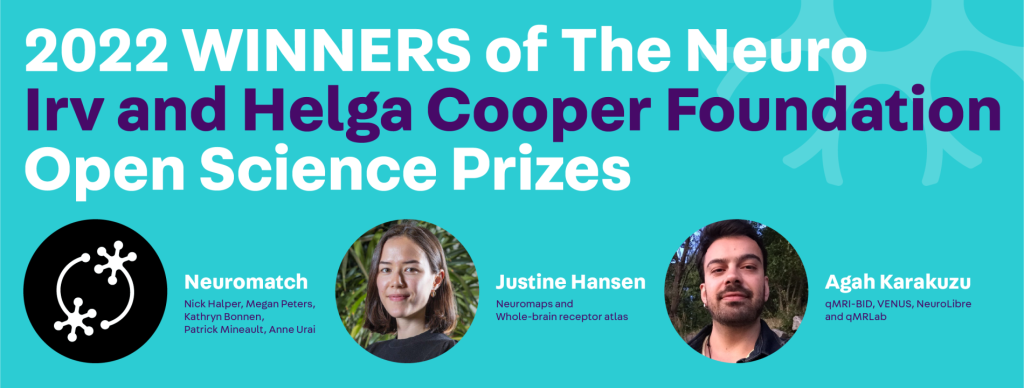
Earlier this month, the awardees of The Neuro Irv and Helga Cooper Foundation Open Science Prizes were announced and the Canadian trainee prize was awarded to CONP scientist, former CONP scholar and open science champion, Agâh Karakuzu. This initiative from the Tanenbaum Open Science Institute recognizes researchers that unlock the power of open science in neuroscience to advance research, innovation, and collaboration for the benefit of health and society.
Since starting his PhD in the lab of Nikola Stikov at Montreal’s École Polytechnique/Montreal Heart Institute, all of Karakuzu’s research has been based on the foundations of open science. In four distinct research projects, Karakuzu has shown the potential of innovative open science approaches to improve research reproducibility and data reuse by standardizing quantitative magnetic resonance imaging (qMRI).
First, he led the development of qMRLab, an open source toolbox for processing qMRI data. Using qMRLab, their team published several interactive blog posts on the fundamentals of relaxometry mapping methods, being one of the earliest adoptions of BinderHub for publishing tutorials. By contributing to numerous hackathons, Karakuzu discovered the need for a data standard for interoperable qMRI workflows, leading to his second major open science project, qMRI-BIDS, which helped the qMRI community apply FAIR principles to its activities. Karakuzu led the development of this project, which took four years, implicated more than 30 collaborators from various disciplines, and is now published in Nature Scientific Data. The third project Karakuzu tackled aimed to solve the problem of inter-scanner bias at its root by developing fully transparent qMRI workflows that start with vendor-neutral pulse sequences. Coupled use of these MRI acquisition methods with downstream open-source software and community data standards define a unique software ecosystem called VENUS. In a recent MRM publication, VENUS has been shown to reduce inter-vendor bias by up to 30% for three qMRI maps (T1, MTR and MTsat). To extend the boundaries of transparency from scanner to publication, Karakuzu also worked as the lead developer of Neurolibre, a powerful cloud-based preprint server for reproducible data analyses and key component of the publishing arm of the CONP.
Karakuzu says he realized the importance of open science in the qMRI field early on in his PhD, saying “if we cannot open up vendor blackboxes, then we cannot standardize qMRI”. The field is still plagued by inconsistencies in the way scanners from different vendors collect data and reconstruct images, which limits interoperability of the resulting datasets. Karakuzu hopes that working transparently and in the open not only will help reveal these problems, but it will also prompt MRI manufacturers to address some of these needs. “Open science is my modus operandi as an early career researcher. I don’t classify science as open or regular, because open is the new regular. Sooner or later, vendors and publishers will need to acknowledge this to stay in the game, ” says Karakuzu.
Stikov was overjoyed that the awards committee recognized Karakuzu’s important contributions to open neuroscience, the second recognition in recent months as Karakuzu was also recently awarded an open science prize from the Quebec Bio-imaging Network. “Agâh is a rare researcher. He has a unique vision for the future of magnetic resonance imaging, an unconventional approach to communicating research, and an unwavering commitment to open science,” said Stikov. “It is people like Agâh that make academic life worthwhile, and it is truly a joy to mentor his progress from a PhD student to a leader in the field.”
Karakuzu completed his PhD in March 2022 and has now started his postdoctoral training, continuing to focus on open science solutions to difficult problems in neuroscience. One of the first projects he hopes to tackle is to explore the potential of the VENUS for AI-driven neuroimaging applications, as well as further development of Neurolibre as this platform matures. We look forward to following Karakuzu’s career as he continues to make great strides to improve neuroscience through innovative open science approaches.
